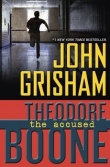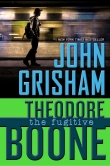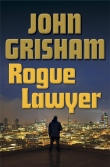
Текст книги "Gray Mountain"
Автор книги: John Grisham
Соавторы: John Grisham
Жанры:
Политические детективы
,сообщить о нарушении
Текущая страница: 23 (всего у книги 27 страниц)
There was no doubt she would say yes, and this excited her. The job was perfect; she would return to her home, to the city she loved, and to a job that was prestigious and promising. She could avoid the horrors of Big Law while pursuing a meaningful career. The bind was in the quitting. She could not simply walk away in a month or so and dump everything on Mattie. No, there had to be a more graceful and equitable exit. She was thinking of a short deferment—an acceptance now with an arrival on the job in six months or so. That would be fair, or as fair as possible. She could sell it to both Mattie and Andy, couldn’t she?
A phone was buzzing under a pile of clothing. She finally found it and said, “Yes.” It was Jeff’s spy phone, and he responded with “Are you cold?”
She smiled and asked, “Where are you?”
“I’m about forty feet away, hiding in the dark, leaning against the back of the garage, my feet stuck in eight inches of frozen snow. Can you hear my teeth chattering?”
“I think so. What are you doing here?”
“That should be obvious. Look, Annette just turned off the lights over there, so the coast is clear. I think you should make some coffee, decaf if you have it, and open the damned door. Trust me, no one will see me. The neighbors have been asleep for two hours. Once again, all of Brady is dead.”
She opened the door, and without as much as a squeak Jeff appeared from the dark stairs and pecked her on the lips. He took off his boots and parked them next to hers. “Staying, are we?” she asked as she poured water into the coffee machine.
He rubbed his hands together and said, “I think it’s warmer outside. Have you complained to the landlord?”
“Haven’t thought about it. No rent means no complaints. Nice to see you out of jail.”
“You’re not going to believe what I’ve dug up.”
“And that’s why you’re here, to tell me all about it.”
“Among other things.”
On the night Donovan died, his Cessna was parked at the Charleston airport for about seven hours, from 3:20 to 10:31 p.m., according to air traffic control records and data from the general aviation terminal. After he landed, he rented a car and took off to meet with his legal team. While he was gone, four small planes arrived at the ramp; two bought fuel, dropped off a passenger, and left, and the other two tied down for the night. One of these was a Beech Baron, the other a King Air 210, a popular twin-engine turboprop that seats six passengers. The King Air arrived at 7:35 p.m. with two pilots and one passenger. All three got off the airplane, entered the terminal, did their paperwork, and left with a guy in a van.
Samantha listened without a word and poured the decaf.
According to Brad, an employee who worked the ramp that night, there were actually two passengers on the King Air, one of whom stayed behind. That’s right—he spent the night on the airplane. As the two pilots were going through their postflight routines, Brad caught a glimpse of the passenger on the ground speaking to a passenger still on the plane. From a distance, he watched, and he waited, and sure enough the pilots closed the King Air’s only door. When their aircraft was secure for the night, they walked into the terminal, with the passenger, as if all was well.
Bizarre, but Brad had actually seen this once before, a couple of years earlier when a pilot landed late at night, had neither a hotel reservation nor a rental car, and decided to just sleep a few hours in the cockpit and take off at dawn. The difference was that that pilot had made his intentions known and the ramp guys knew what he was doing. With the King Air, though, only Brad knew what was happening. He kept an eye on the airplane until 10:00 p.m., when he punched out and went home. Two days later he was fired for missing work. He had never liked his job and hated his boss. His brother got him a job in Florida and he left town. No one had ever interviewed him about the events of that night. Until now, of course.
“How’d you find him?” she asked.
“The guard who arrested me Sunday night gave me his name. Turns out Mack, the guard, is a pretty great guy. We had beers late Monday night, me buying of course, and Mack gave me the dirt on Brad. Brad’s back in Charleston now. I found him last night, and, in another bar, we had some drinks. I’m detoxing tonight so don’t offer me anything.”
“There’s not a drop in the house.”
“Good.”
“So, your theory is?”
“My theory is that this mysterious passenger waited until the right moment, opened the door of the King Air, walked about thirty yards in the darkness, straight to Donovan’s Cessna, and in about twenty minutes loosened the B nut. Then he backtracked, climbed into the King Air, and was probably watching when Donovan showed up around 10:15 for his departure. After that, he kicked off his shoes and slept until sunrise.”
“Sounds impossible to prove.”
“Maybe, but I’m getting there.”
“Who owns the King Air?”
“A charter service out of York, Pennsylvania, a company that does a lot of business with coal companies. The King Air is the workhorse in the coalfields because it’s durable, has a nice payload, and works off short runways. This company has four available for charter. There are plenty of records so we’ll soon know everything about the flight. Brad says he’ll give an affidavit, though I’m a little worried about him.”
“This is incredible, Jeff.”
“It’s huge. The investigators will grill the owners of the plane, the pilots, the passenger or passengers, and whoever chartered it for the trip. We’re getting closer, Samantha. It’s an unbelievable break.”
“Nice work, Sherlock.”
“Sometimes you just gotta get yourself arrested. You have an extra quilt somewhere around here?”
“They’re all layered up on the bed. That’s where I was, reading.”
“Was that a pickup line?”
“We’re already picked up, Jeff. The question at the moment is sex, and I hate to tell you it’s not going to happen. Not the best time of the month.”
“Oh, sorry.”
“You could’ve called.”
“I guess. Then why don’t we just cuddle and share body heat and sleep together, I mean, you know, actually sleep?”
“I suppose that will work.”
33
She had no idea what time he left. When she awoke, a few streaks of morning light penetrated the blinds and windows. It was almost 6:00 a.m. His side of the bed was not warm, as if he’d been gone for hours. Whatever. He lived in the shadows and left few trails, and that was fine with her. He carried burdens and baggage she would never understand, so why bother? She thought about him for a few moments, as she peeked from under the quilts and watched damp clouds follow her breathing. It was cold out there, and she had to admit she longed for his warmth.
She also longed for a hot shower, but that would not be happening. She counted to ten, threw off the covers, and raced to the coffeepot. It took forever to brew, and when she finally had a cup she crawled back under the covers and thought about New York. Her plans were to polish up her response to Andy and e-mail it first thing. Was it too pushy, too demanding? She was, after all, unemployed and he was offering a wonderful job. Did she have the right to nag about her associates and clients, about Mr. Nick Spane, and the dimensions of her new office? Would her deferment scheme please Andy, or irritate him? She wasn’t sure, but Andy had a thick skin. If she didn’t assert herself in the beginning she would certainly get run over later.
She skipped the cold shower and did a bird bath with lukewarm water in the sink. With no court appointments on the calendar, she dressed quickly in jeans and boots, flannel shirt and sweater. When she was properly bundled, she looped her satchel over one shoulder, her purse over the other, and left for work on foot. The air was crisp and still, the sun brilliant as it rose. It was a beautiful winter day, with snow still untouched in thick drifts against the houses. Not a bad way to get to work, she thought, as she walked through Brady.
On the negative side: In New York she would be packed into a subway train, then jostling through heavy foot traffic. Or perhaps sitting in the back of a dirty cab, waiting in traffic.
She spoke to Mr. Gantry as he fetched his newspaper off the sidewalk. He was pushing ninety, lived alone since his wife died last year, and in warmer weather had the prettiest lawn on the street. All snow on his property had been meticulously scraped and shoveled.
As usual these days, she arrived first at the office and, as the intern, went straight to the coffeepot. As it brewed, she tidied up the kitchen, emptied all the wastebaskets throughout the place, and straightened magazines in the reception area. No one had ever told her to do these things.
On the positive side: In New York, Spane & Grubman would pay someone else to do such chores.
On the neutral side: Samantha really didn’t mind doing them, not here anyway. She wouldn’t dare do them at a real firm, but at the Mountain Legal Aid Clinic everyone pitched in.
She sat in the conference room and watched the early traffic on Main Street. Now that she was planning to leave, she was astonished at how fond of the place she had become in three short months. She decided she would postpone the discussion with Mattie and wait until she knew more about Andy’s offer. The thought of telling her she was leaving so soon was unsettling.
Mattie’s mornings were still slower, but she seemed to be finding her old self. Donovan’s absence was a jagged wound that would never heal, but she couldn’t stop living. She had too many clients who needed her, too many entries in her calendar. She rolled in just after nine and asked Samantha to step into her office. With the door closed, she explained that she’d lost sleep the night before worrying about those wretched Crump people and poor old dead Francine. The only ethical thing to do was to poll the local bar and see if anyone had been hired by the family. If so, they would zip over a copy of the will and start the war. Mattie handed over a list and said, “Not including us, there are fourteen lawyers in Brady, all alphabetized with phone numbers. I’ve already talked to three, including Jackie Sporz, the lawyer who did the will five years ago. None has heard from the family. You pick five and let’s get it done this morning. I’m tired of worrying about it.”
Samantha had met all but two. She went to her office, grabbed the phone, and called Hump. He said no, he’d never heard of the Crumps. Lucky for him. The second call was to Hayes Sinclair, a lawyer who never came out of his office and was rumored to suffer from agoraphobia. No, he had never heard of the Crumps. The third call was to Lee Chatham, a lawyer who never stayed in his office but was always hanging around the courthouse, posturing as if he had important business there and trafficking in gossip, most of which he created. Bingo. Mr. Chatham said yes, he had met with several of the Crumps and had a contract to represent the family.
Evidently, they were pressing ahead with their fiction that their mother destroyed the free will prepared by those crooks over at legal aid, and therefore things would revert back to the prior will, which split everything equally. Mr. Chatham’s plans were to open the estate in the near future and proceed with the prior will. However, they were bickering over who would serve as executor. Jonah, the oldest, had been appointed by Francine five years ago, but he was having heart problems (brought on by the stress of this situation), and probably couldn’t serve. When Mr. Chatham mentioned replacing Jonah with a substitute executor, a fight started amongst the other four. He was currently trying to arbitrate matters.
Samantha dropped the bomb about the mysterious package they had received the day after the funeral. She made sure Mr. Chatham understood that neither she nor anyone at the clinic had any desire to get involved in a will contest, but it was important for him to know that his clients were lying. By the time she hung up, he was mumbling incoherently to himself. She faxed a copy of the last will to his office, and left to tell Mattie.
“That’ll really piss ’em off, won’t it?” she said when she heard the news. “One threat, and I’m going to the sheriff.”
“Should we get some handguns?” Samantha asked.
“Not yet.” She tossed some papers across the desk. “Take a look.” It was thick, whatever it was, and Samantha sat down. “What is it?” she asked as she flipped a page.
“Strayhorn, notice of appeal in the Tate case. I talked to the trial judge late last week about the alleged settlement. Needless to say, he was not sympathetic, so we’re screwed. Now we have to slog our way through the appeals process and hope the Supreme Court doesn’t reverse.”
“Why am I holding this?”
“I thought you might be interested. And, Samantha, we need you to handle the appeal.”
“I think I saw this coming. I’ve never touched an appeal, Mattie.”
“You’ve never touched most things around here. There’s always a first time. Look, I’ll supervise, and you’ll learn quickly that it’s just a lot of paperwork and research. Strayhorn goes first and files their thick brief in ninety days. They will allege all manner of grievous errors at trial. We respond, point counterpoint. In six months almost all of the work is done and you’ll be waiting on oral argument.”
But in six months I’ll be gone, Samantha wanted to say.
“It’ll be great experience,” Mattie pressed on. “And for the rest of your life you can say you handled an appeal to the Supreme Court of the Commonwealth of Virginia. How can you top that?” She was aiming at levity but it was clear Mattie was anxious.
“How many hours?” Samantha asked. She was calculating quickly and already thinking that she could do virtually all of the research over the next six months, before she left.
“Donovan swore it was a clean trial, nothing major to quibble over on appeal. I’d guess five hundred hours, from now through oral argument, which is about fifteen months away. I know you’ll be gone by then, so one of us will handle that part. The heavy lifting takes place now. Annette and I simply do not have the time.”
Samantha smiled and said, “You’re the boss.”
“And you’re a dear. Thanks Samantha.”
Andy fired back:
Dear Miss Sam: Thanks so much for your lovely epistle. You’ve gotten so soft in only three months. Must be all those cookies. If I read you right, you want some assurances that you’ll be (1) adored by your bosses, (2) worshipped by your colleagues, (3) appreciated by your clients, (4) virtually guaranteed a partnership which will lead to a long, full, happy life, and (5) given enough office space to make you happy, in spite of the obscene prices per square foot now being demanded by Manhattan landlords (our clients), recession or not.
I’ll see what I can do. Attached is a bio of Nick Spane. Oddly enough, he’s had just one divorce and has been married to the same great gal for about fifteen years now. As you’ll see, he has no felony convictions for rape, child abuse, etc., nor has he been indicted for dealing in child porn. Too, he has never been sued for sexual harassment, or anything else for that matter. (His divorce was no-fault.) He’s actually a great guy, I swear. A Southern guy—Tulane, Vanderbilt Law—with impeccable manners. Odd for these parts.
Later, Andy
The spy phone buzzed at 2:30 as Samantha was rereading Strayhorn’s notice of appeal and reviewing the rules for appellate procedure. “Are you outside my office standing in the snow?” she asked, walking to the kitchen, which she assumed was bug-free.
“No, I’m in Pikeville meeting with some investigators. I enjoyed last night, slept warm and sound. You?”
“I slept well. What time did you leave this morning?”
“Just after four. I’m not sleeping much these days, you know. Somebody’s back there, always watching. Kinda hard to sleep.”
“Okay. What’s on your mind?”
“Saturday, hiking around Gray Mountain, in the snow. Grilling a steak on the cabin porch. Drinking some red wine. Reading by the fire. That sort of thing. Are you up to it?”
“Let me think about it.”
“What’s there to think about? I’ll bet that if you’ll glance over at your calendar you’ll see that there’s nothing written down for this Saturday. Go ahead.”
“I’m busy right now. I’ll have to call you back.”
Though it had not been mentioned by anyone at the clinic, Samantha was learning that the cold weather and short days of January slowed business considerably. The phone rang less and Barb spent more time away from her desk, always “running errands.” Claudelle was eight months pregnant and on bed rest. The courts, never in a hurry, clunked along at even slower paces. Mattie and Annette were as busy as ever with existing cases, but new ones were not dropping in. It was as if conflict and misery took a break as the wintertime blues settled in. At least for some.
As Samantha was puttering around the office after dark on Friday, she heard the front door open. Mattie was still in with her door closed; everyone else was gone for the weekend. Samantha walked to the reception area and said hello to Buddy and Mavis Ryzer. They had no appointment; they had not called. Instead, they had driven an hour and a half from West Virginia to Brady late on a Friday afternoon to seek solace and guidance from their attorney. She hugged them both and knew immediately that their world had come to an end. She showed them to the conference room and offered a soft drink; they declined. She closed the door, asked what was going on, and both started crying.
Buddy had been fired by Lonerock Coal that morning. The foreman said he was physically unfit to work; thus the immediate termination. No exit package, no farewell bonus, no cheap watch for a job well done and certainly no golden parachute, just a hard kick in the ass with a promise that the last paycheck was in the mail. He’d barely made it home when he collapsed on the sofa and tried to collect himself.
“I got nothing,” he said between breaths as Mavis wiped tears and rattled away. “I got nothing.”
“Just like that, he’s outta work,” Mavis said. “No paycheck, no black lung benefits, and no prospect of finding any kind of work. All he’s ever done is work in the coalfields. What’s he supposed to do now? You gotta help us, Samantha. You gotta do something. This ain’t right.”
“She knows it ain’t right,” Buddy said. Each word was labored as his chest rose and fell with each noisy breath. “But there’s nothing you can do. They busted our union twenty years ago, so we got no protection from the company. Nothing.”
Samantha listened with great sympathy. It was odd to see such a tough guy like Buddy wiping his cheeks with the back of a hand. His eyes were red and puffy. Normally, he would have been embarrassed at such emotion, but now there was nothing to hide. Eventually, she said, “We’ve filed our claim and we have a strong report from the doctor. That’s all we can do right now. Unfortunately, in the states around here an employee can be terminated at will for any cause, or for no cause.”
She thought the obvious but wasn’t about to mention it: Buddy was in no shape to work. As much as she despised Lonerock Coal, she understood why the company would not want an employee in his condition operating heavy equipment.
There was a long silence, broken only by Mattie, who pecked on the door and stepped inside. She greeted the Ryzers, realized an unpleasant meeting was under way, and started a quick exit. “I’ll see you for dinner, Sam?”
“I’ll be there. Around seven?”
The door closed and they returned to the silence. Mavis finally said, “It took my cousin eleven years to get his black lung benefits. He’s on oxygen now. My uncle, nine. I hear the average is something like five years. That about right?”
“For contested claims, yes, five to seven is the average.”
“I’ll be dead in five years,” Buddy said, and they thought about this. No one argued with him.
“But you said all claims are contested, right?” Mavis asked.
“I’m afraid so.”
Buddy just shook his head, slightly but without stopping. Mavis went silent and stared at the table. He coughed a few times and seemed on the verge of a gagging fit, but managed to swallow hard and fight it. His deep desperate breaths sounded like muffled roars from within. He cleared his throat again and said, “You know, I should’ve got my benefits ten years ago, and if I had I could’ve got out of the mines and found work somewhere else. I was only thirty back then, the kids were little, and I could’ve done something else, away from the dust, you know. Something that didn’t make the disease any worse. But the company fought me and it won, and so I had no choice but to keep working in the mines, and keep breathing the dust. I could tell it was getting worse. You just know it. It creeps up on you but you know that walking up the four steps to the front porch is harder now than it was a year ago. Walking to the end of the driveway takes a bit longer. Not much, but things get slower.” A pause for deep breaths. Mavis reached over and patted his hand. “I remember those guys in court, in front of the administrative law judge. Three or four of them, all in dark suits and shiny black shoes, all strutting around so important. They would look over at us like we was white trash, you know, just an ignorant coal miner with his ignorant wife, just another deadbeat trying to game the system for a monthly check. I can see them right now, arrogant little shits, so smart and smug and cocky because they knew how to win and we didn’t. I know it’s not very Christian-like to hate, but I really, really despised those guys. It’s even worse now because we know the truth, and the truth is that those crooks knew I had black lung. They knew, yet they covered it up. They lied to the court. They brought in another set of lying doctors who said, under oath, that I didn’t have black lung. Everybody lied. And they won. They kicked me outta court, put me back in the mines, for ten years now.”
He stopped and rubbed his eyes with his fingers.
“They cheated, they won, and they’ll do it again because they write the rules. I guess there’s no way to stop them. They got the money, the power, the doctors, and I guess the judges. Some system.”
“There’s no way to stop them, Samantha?” Mavis pleaded.
“A lawsuit, I guess. The one Donovan filed, and there’s still a chance that another firm might refile it. We haven’t given up.”
“But you’re not taking the case, right?”
“Mavis, I’ve explained this before. I’m from New York, okay? I’m an intern, here for only a few months, then gone. I cannot initiate a lawsuit that will take five years of pretty intense litigation in federal court. We’ve covered this, right?”
Neither responded.
Minutes passed as the offices grew even quieter; the only sound was Buddy’s painful breathing. He cleared his throat again and said, “Look, Samantha, you’re the only lawyer we’ve ever had, the only one who’s ever been willing to help us. If we’d had a lawyer ten years ago maybe things would be different. But anyway, we can’t go back there. We drove over here today to say one thing, and that’s to thank you for taking my case.”
“And being so kind to us,” Mavis said, jumping in. “We thank the Lord every day for you and your willingness to help us.”
“It means more than you’ll ever know.”
“Just having a real lawyer out there fighting for us means so much.”
Both were crying again.








